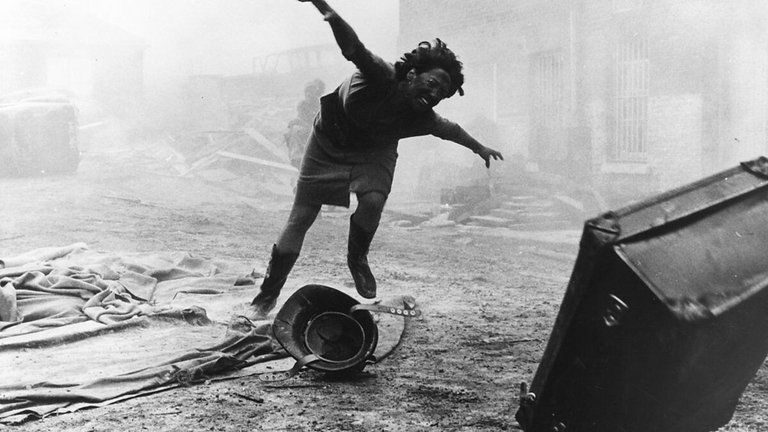Film Review: The War Game (1966)

In recent years, certain parts of the world that once prided themselves on their pacifism and enlightenment have begun to view war not as a horror to be avoided but as an opportunity—whether for economic gain, revival of questionable political projects, or a nostalgic reclamation of imperial prestige. This dangerous romanticisation of conflict disregards its human cost, unpredictability, and the terrifying potential for escalation into nuclear annihilation. Decades ago, such complacency would have been unthinkable. In the shadow of the Second World War, the spectre of total war haunted global consciousness, and leaders and citizens alike understood the stakes of nuclear brinkmanship with visceral clarity. This awareness is central to The War Game, Peter Watkins’ harrowing 1966 film—a masterful fusion of speculative fiction and documentary that remains one of the most incisive and unnerving works of its kind.
The film was produced for the BBC, continuing Watkins’ collaboration with the network that had previously yielded Culloden, his groundbreaking docudrama about the 1746 battle. Like its predecessor, The War Game employs a quasi-documentary style, but this time it shifts focus to a chillingly plausible near-future scenario: the nuclear annihilation of Great Britain. Set against the backdrop of the Cold War, the film imagines a chain of events triggered by sudden escalation of still ongoing Vietnam War, which spirals into a global conflict. The Soviets retaliate with thermonuclear weapons targeting Britain—a NATO ally—given its strategic position and dense urban centres. Unlike other Cold War dramas that fixate on geopolitics or military strategy, Watkins’ lens is resolutely human. He asks not how the war begins, but what happens next to ordinary civilians, whose lives are obliterated by a conflict they did not choose.
The film’s narrative unfolds with grim precision. It opens with the British government implementing civil defence plans: evacuations, air-raid drills, and the distribution of inadequate “protective” materials. Yet these measures prove laughably insufficient. The attack affects Kent, a region not directly hit but still ravaged by fallout and blast waves. Cities erupt into firestorms, incinerating thousands. Survivors suffer horrific burns, blindness, and radiation sickness. Emergency services collapse under the scale of the disaster; hospitals are overwhelmed, and desperate authorities resort to mercy killings to spare the terminally injured. Amid the chaos, communities fracture into violent factions fighting over dwindling food supplies. The film’s harrowing climax follows traumatized children, their innocence shattered, whispering that they want “to be nothing” as adults—a chilling indictment of war’s psychological toll.
Watkins’ approach mirrors that of Culloden, blending a stark, authoritative narration (voiced by Michael Aspel and Peter Graham) with visceral live-action footage. Non-professional actors play victims and policemen, lending authenticity to scenes of chaos and despair. The black-and-white cinematography, a practical choice given BBC technical constraints, paradoxically softens the horror—burn victims’ injuries, while still harrowing, lack the visceral shock of colour. Intercut with the speculative narrative are “documentary” segments: interviews with ordinary Britons, who reveal their ignorance about nuclear warfare, and experts discussing the religious rationalisation of mass destruction, the delusional optimism of U.S. strategist claiming “limited” nuclear war, and the medical realities of radiation poisoning. The narration repeatedly reminds viewers that the film’s grim scenarios are grounded in historical precedent—data from Hiroshima, Nagasaki, and WWII firebombings—as well as government civil defence reports.
Watkins’ unflinching pacifism permeates every frame of The War Game. By refusing to sanitise the consequences of nuclear war, he dismantles the Cold War era’s complacent rhetoric about “winning” a conflict. His film argues that there are no winners, only victims. The BBC, however, deemed this message “too disturbing” for television audiences and shelved the film. Critics suspect political pressure from the British government, which had long promoted the myth that Britons could “weather” nuclear war as they had the Blitz—a lie exposed by Watkins’ meticulous research. Despite the ban, Watkins secured theatrical screenings, earning prestigious festival awards and an Academy Award for Best Documentary. The BBC’s eventual lifting of the ban in 1985 allowed later works like Threads (1984) to build on its legacy, ensuring its warning resonated across generations.
The War Game endures as a searing critique of human folly and a testament to Watkins’ genius. Its power lies not in shock value but in its clinical, almost scientific, portrayal of collapse. By humanising the abstract horror of nuclear war, Watkins forces viewers to confront the unthinkable—a task even more urgent today as it was in 1966. The film’s legacy is a stark reminder: the price of peace is eternal vigilance, and the cost of complacency is incalculable.
RATING: 8/10 (+++)
Blog in Croatian https://draxblog.com
Blog in English https://draxreview.wordpress.com/
InLeo blog https://inleo.io/@drax.leo
Hiveonboard: https://hiveonboard.com?ref=drax
InLeo: https://inleo.io/signup?referral=drax.leo
Rising Star game: https://www.risingstargame.com?referrer=drax
1Inch: https://1inch.exchange/#/r/0x83823d8CCB74F828148258BB4457642124b1328e
BTC donations: 1EWxiMiP6iiG9rger3NuUSd6HByaxQWafG
ETH donations: 0xB305F144323b99e6f8b1d66f5D7DE78B498C32A7
BCH donations: qpvxw0jax79lhmvlgcldkzpqanf03r9cjv8y6gtmk9